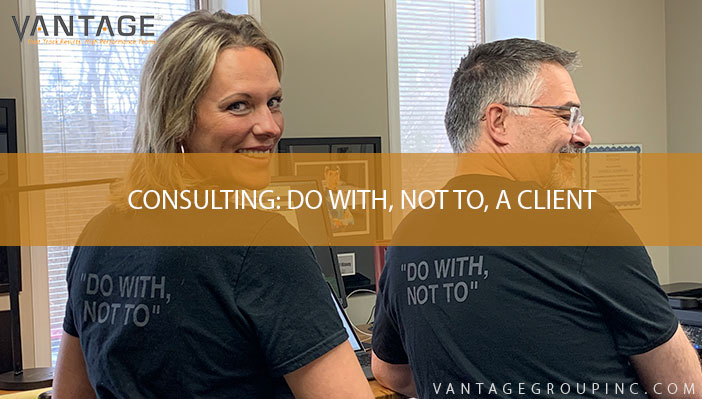To us, effective consulting means helping our clients take action on pressing issues. But that is just the tip of the iceberg
By Darrell Crawford, Founder and Managing Partner
Consultants and advisors seem to come and go in many industries. We have noticed a parade of lean, marketing and family business consultants go through the doors of companies and leaving little impact on the changes needed to drive innovation. Why is that happening?
Part of what we have noticed is a philosophy of “doing to” the people in these companies. For example, we saw a lean consultant go through an extensive analysis for a local manufacturer for several months. The output of all this research was a process of tools and metrics that were imposed on the frontline staff. However, there was little to no effort to obtain insights and feedback from the frontline staff directly impacted by these changes. This approach, as we often see, lead to unsustainable and ineffective results.
Why? They didn’t work closely with those most familiar with the areas being looked at for improvement.
By not involving those closest to the problems, they missed truly understanding the problems at their root cause. Additionally, they didn’t garner the necessary buy-in to the changes being made. This left those impacted by change feeling as though the changes were imposed upon them.
The result was a short-lived program with many people creating additional disjointed-countermeasures and deviated exceptions to the processes put in place to make up for critical information and understanding that was missing. Along with that came a general dissatisfaction and distrust in management to truly understand the issues that the frontline manufacturing staff were facing.
Unfortunately, this scenario is played out in many industries when companies pay large sums to high-priced consultants to swoop in and solve some of their most pressing problems. When you don’t choose a partner that works with everyone, including those closest to the company’s issues, you just end up paying for more tools, more processes, ineffective short-term results and no buy-in from the most important people.
Is this something your company has faced? How do you effectively find and work with an advisor or consultant that can truly make a difference and get the value you’re looking for?
Do With, Not To
To us, effective consulting means helping our clients take action on pressing issues. But that is just the tip of the iceberg. What supports any change effort is establishing agreement within the organization that the correct problem is identified, determining what action makes sense and ensuring all stakeholders participate in the fact-gathering and problem-solving process.
When clients participate in the diagnostic process they are more likely to acknowledge their role in problems and to accept a path forward that is inclusive of key stakeholders. What makes the best advisors are those that establish such mechanisms as joint consultant-client task forces to work on data analysis and other parts of the diagnostic process. As the process continues, managers naturally begin to implement corrective action without having to wait for formal recommendations. This is an ideal and highly effective process we follow with our clients.
It’s the Vantage Group difference; we ”Do with, not to” our clients.
In other words, we deploy a process that identifies who is important to involve, how to engage them in the fact-finding, and work with them to develop the processes necessary to solve the problem.
In this way we diagnose strategic problems in connection with organizational issues. We get some sense of the skills of the key people—what they can do and how they work. When we emerge with strategic and organizational recommendations, they are usually well accepted because they have been thoroughly tested.
The idea that a successful consultant depends on strong analytical expertise and an ability to present convincing reports is losing ground in today’s world. Today, consultants with strong process skills that involves working with your people is what drives practical help in improving the organization’s future performance. However, increasing consensus, commitment, learning and future effectiveness are not substitutes for the analytical skills of an advisor, but rather the necessary outcome of a really effective process.
When your advisor comes with a “do with” approach to your business and people, the behaviors needed to drive success will improve an organization’s ability to solve future and current problems.

